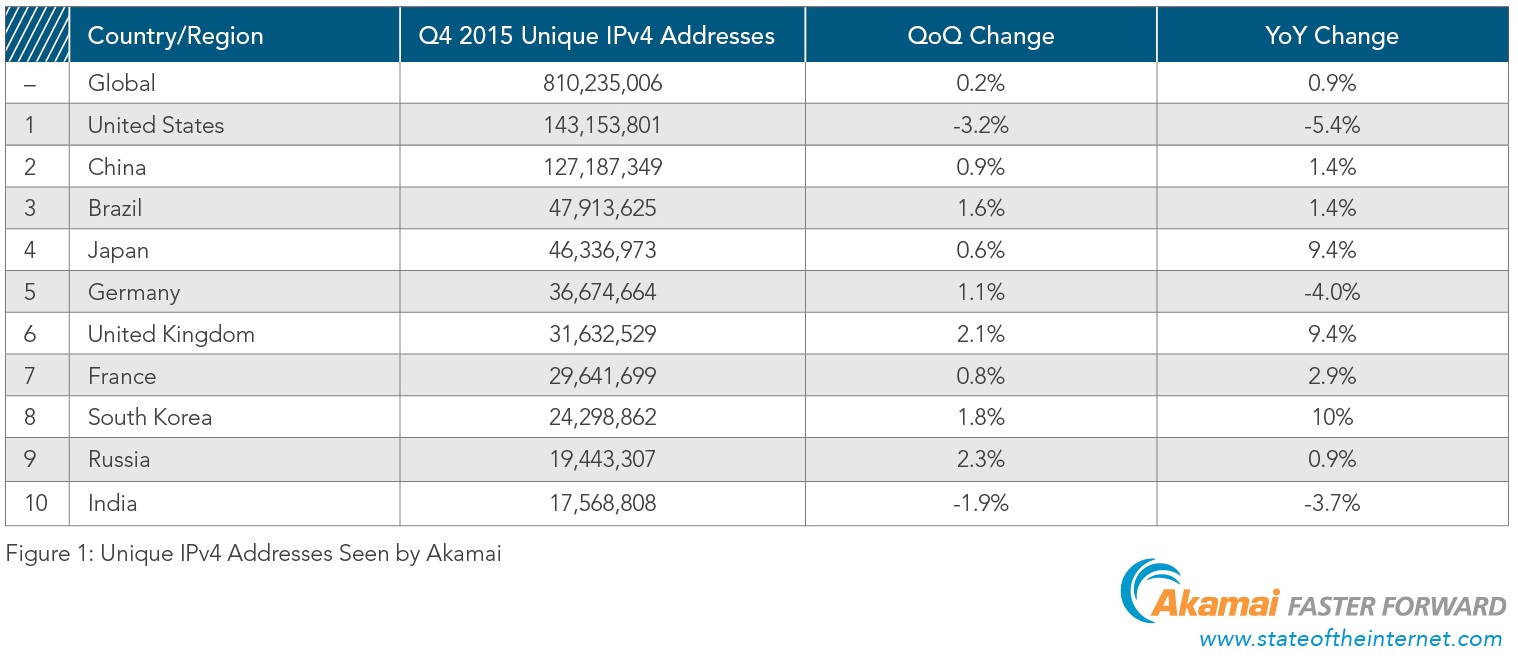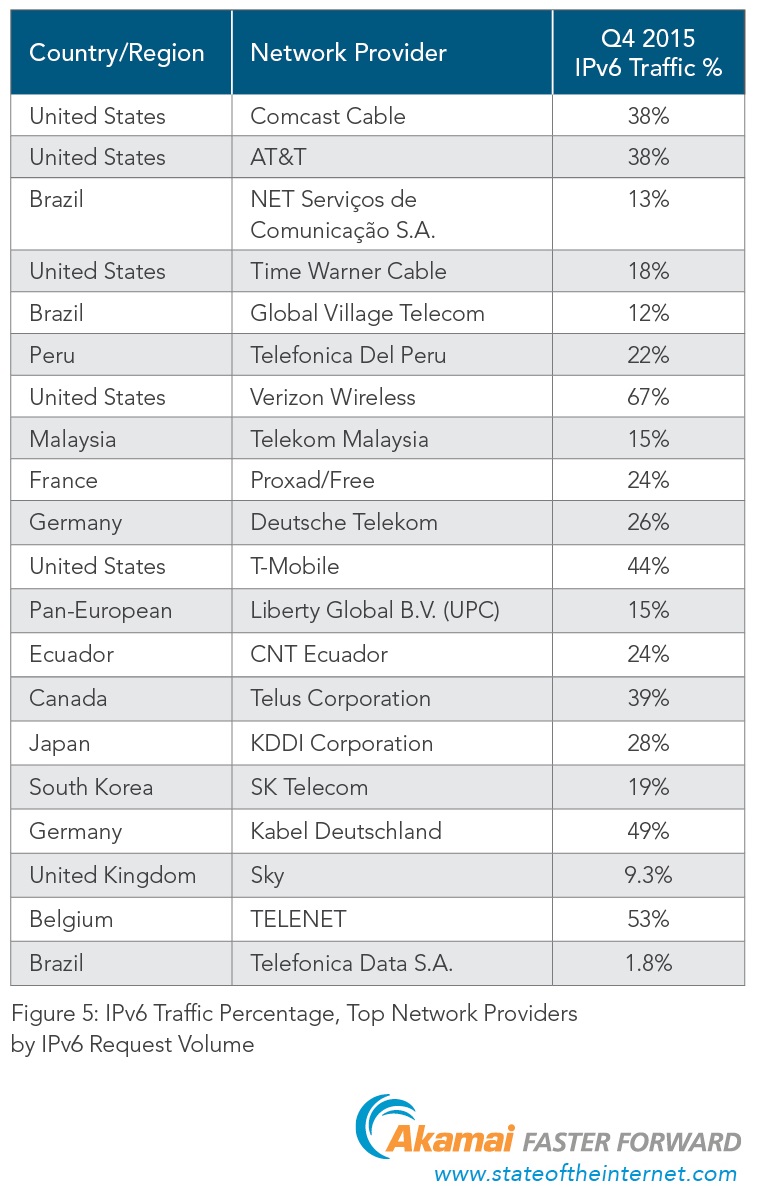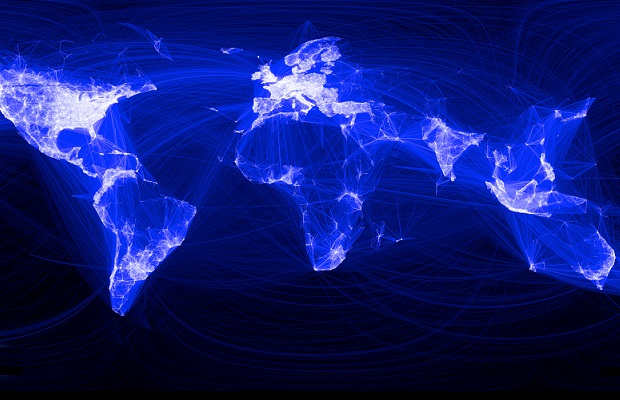The world wide web is getting faster, with global average internet connection speeds up to 5.6 Mbps, marking a 23% increase year-over-year, according to new data.
The figures, from Akamai Technologies, provide insight into key global statistics such as connection speeds, broadband adoption metrics, notable Internet disruptions, IPv4 exhaustion and IPv6 implementation.

“This quarter’s report shows great year-over-year growth in average connection speeds and overall broadband adoption,” noted David Belson, editor of the State of the Internet Report. “This is particularly important as consumer expectations rise and many high-profile events, like the summer games in Rio, will be streamed this year. The progress we’re seeing across our key metrics shows that, while there’s still work to be done, more parts of the world are increasingly able to support the delivery of broadcast-quality video content online.”
Highlights from Akamai’s Fourth Quarter, 2015 State of the Internet Report:
Average and Peak Connection Speeds: Positive growth trends continued for European countries
· Global average connection speed increased 8.6% to 5.6 Mbps from the third quarter, a 23% increase year-over-year.
· South Korea had the top average connection speed at 26.7 Mbps, followed by Sweden (19.1 Mbps) and Norway (18.8 Mbps). Four other European countries appeared in the global top 10 country/region list; the Netherlands (17.0 Mbps), Switzerland (16.7 Mbps), Finland (16.6 Mbps) and Denmark (16.1 Mbps).
· Year-over-year changes in average connection speeds were positive for all European countries surveyed. Ireland saw the smallest change, with a slight 0.7% increase, while Norway had the biggest increase at 65%.
· After a slight decline in the third quarter, the global average peak connection speed bounced back with a 1% increase to 32.5 Mbps in the fourth quarter. This led to 21% year-over-year growth.
· In Europe, Romania again led the region in average peak connection speeds with a 1.0% quarterly increase to 73.6 Mbps. A total of fifteen European countries had average peak connection speeds of at least 50 Mbps, compared to thirteen countries in the third quarter.
Broadband Connectivity: European countries continued to forge ahead with 25 Mbps adoption
· Globally, 7.1% of unique IP addresses connected to Akamai at average speeds of at least 25 Mbps, a dramatic 37% increase over the previous quarter. Year-over-year, global 25 Mbps adoption increased by 74%, in contrast to the 15% yearly decrease seen in the third quarter. Portugal led the world with a massive 441% yearly increase in 25 Mbps adoption (to 9.0% adoption). Other European countries to achieve impressive significant year-on-year gains included Denmark (up 188%) and Norway (up 165%).
· European countries once again dominated the global top 10 country/region listing for 25 Mbps adoption: Sweden (ranked #2), Norway (#3), Latvia (#4), Finland (#6), Denmark (#8), the Netherlands (#9) and Lithuania (#10). In the fourth quarter, the relatively modest 6.7% and 16% gains of Switzerland and the Czech Republic were not enough to keep them in the top 10 listing. Denmark and Lithuania took their spots, with quarterly increases of 47% and 41% respectively.
· The global percentage of unique IP addresses connecting to Akamai that met the 4 Mbps broadband speed threshold increased 5.8% to 69%. Year-over-year growth was 17%. In Europe, the Netherlands led the way with a 0.8% quarterly increase to an adoption level of 96%. A further nine European countries enjoyed 4 Mbps broadband adoption rates of 90% and above: Denmark (94%), Switzerland (94%), Belgium (93%), Sweden (93%), Hungary (92%), Austria (92%), Romania (91%), Finland (91%) and Norway (90%).
· In the fourth quarter of 2015, 32% of unique IP addresses across the world connected to Akamai at average speeds above 10 Mbps, an increase of 15% over the previous quarter. Year-over-year, this was a 34% increase. Quarterly changes in adoption rates were positive across the European countries surveyed with the exception of Romania, which posted a 6.8% loss. Italy had the largest quarterly increase at 50%, while the remaining countries saw gains ranging from Ireland’s 0.9% to Hungary’s 32%.
· 19% of unique global IP addresses connected to Akamai at average “4K-ready” connection speeds of 15 Mbps or above, up from 15% in the third quarter. In Europe, Norway overtook Sweden for the top position in 15 Mbps adoption, with an adoption rate of 45%, up 21% from the third quarter. Year-over-year gains among the European countries surveyed were robust, ranging from 24% in Romania and Switzerland to 173% in Portugal. Six countries surveyed saw 15 Mbps broadband adoption rates more than double; Portugal (173%), Spain (146%), Germany (141%), Italy (141%), Hungary (138%) and Norway (102%).

IPv4 and IPv6: Belgium again led the world in IPv6 adoption
· The number of unique, worldwide IPv4 addresses connecting to Akamai had a slight increase of 0.2% to just over 810 million addresses.
· On a global basis, close to 70% of the countries/regions surveyed saw a quarter-over-quarter increase in unique IPv4 address counts in the fourth quarter, up 10% from the third quarter.
· Belgium again maintained a clear global lead, with 37% of content requests being made over IPv6, up from 35% in the third quarter. Among the top 10 countries/regions listed, France (11% IPv6 traffic) posted the largest quarter-over-quarter gain with 113%.
· Verizon Wireless (67%) and Belgium’s Telenet (53%) continued to lead as the two network providers with more than half of their requests to Akamai made over IPv6.
· Similar to last quarter, nine of the top 20 providers had at least one-in-four content requests to Akamai via IPv6. Eighteen of the top twenty – down from 20 in the previous quarter – had at least 10% of their requests to Akamai occur over IPv6.
Mobile Connectivity: United Kingdom had the world’s fastest average mobile connection speed
· The United Kingdom had the world’s fastest average mobile connection speed at 26.8 Mbps, with Spain in second place at 14.0 Mbps. In the fourth quarter, a further seven European countries had an average mobile connection speed exceeding the 10 Mbps broadband threshold: Belgium, Denmark, Finland, France, Ireland, Slovakia and Sweden.
· In the fourth quarter, Finland and Australia led the world with 99% 4 Mbps adoption rates, followed closely by Sweden with 98% adoption. The quarter saw two further European countries achieve 4 Mbps adoption rates above 90%: Spain (94%) and Denmark (93%).
UK Highlights:
· Unique IPv4 addresses seen by Akamai has risen year on year 9.4% in Q4 2015. The UK has the 6th highest number of IPv4 addresses seen across the globe
· In the UK, Sky was the network provider with the highest percentage of IPv6 traffic requests at 9.3%
· Average connection speeds in the UK rose year on year by 27% to 13.9Mbps. (Ranking it 9th in EMEA and 17th Globally)
· Average peak connection speeds in the UK rose 16% year on year to 56.8Mbps. (Ranking it 11th in EMEA, and 27th Globally)
· The UK is 10th in EMEA for 10Mbps broadband adoption, with 50% of observed connections above that speed. A year on year rise of 32%.
· 32% of UK connections observed were above 15Mbps, a 50% rise year on year. Ranking the UK 8th in EMEA and 12th globally
· 89% of mobile UK connections were above 4Mbps, with the Q4 2015 peak observed at 73Mbps and a quarterly average of 26.8Mbps

